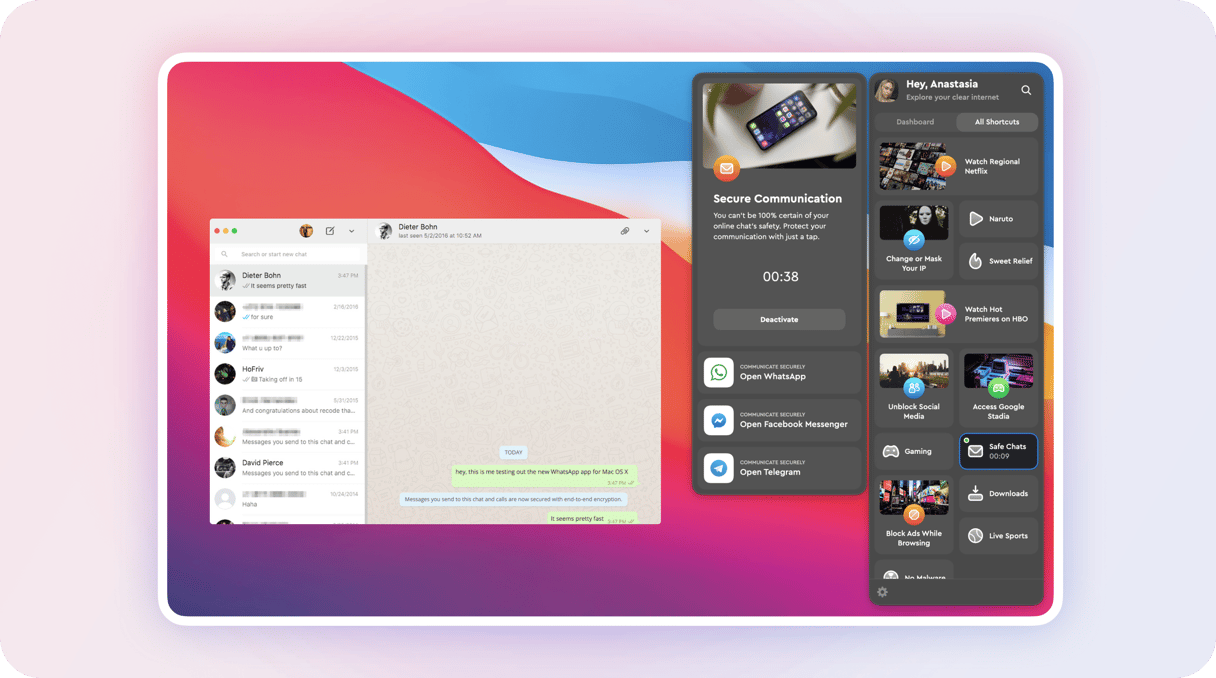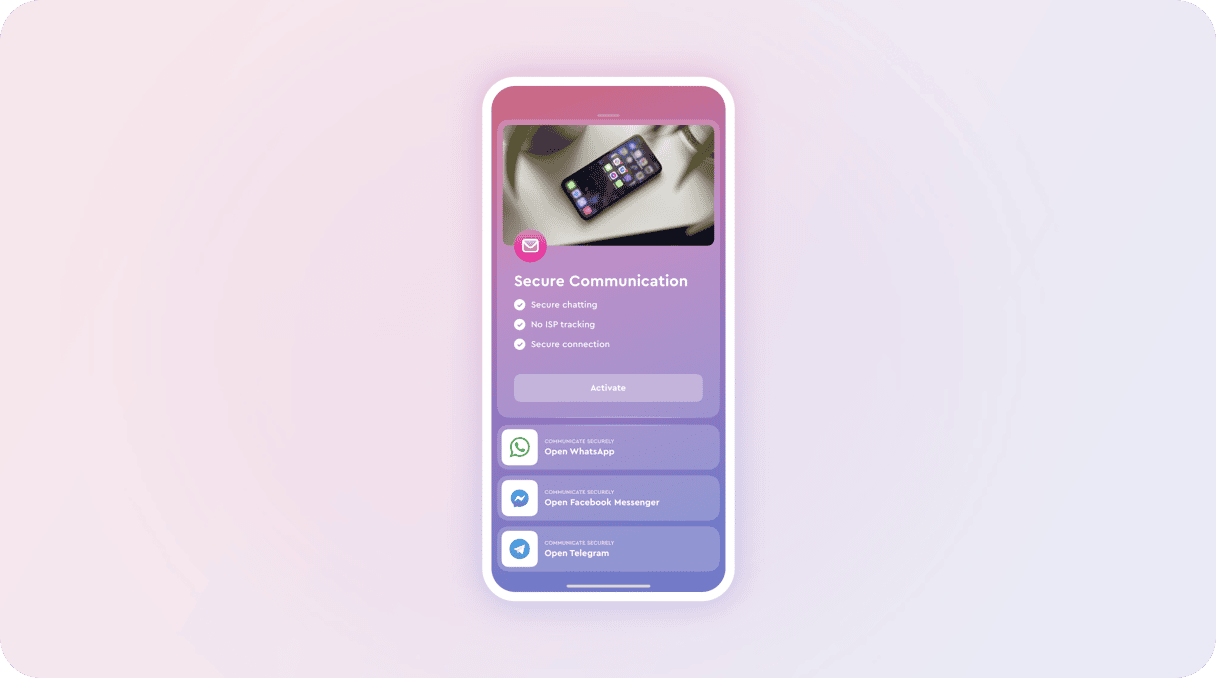Messenger apps are the most convenient way to transmit information today. We use them to text our loved ones, family, friends, coworkers, and even our doctors. We share views and beliefs, delicate photos of ourselves we wouldn’t want to see on the web. Some people even store passwords and PIN codes (in Chats with themselves). There’s so much viable information in the messengers we use, and we believe that our communications are private and secure. But are they really? Let’s see what encrypted messaging is and how (or even whether) it works in the most popular messengers.
What Is End-to-End Encryption?
Encrypted messaging is only completely safe and anonymous if the messenger uses end-to-end encryption. Standard encryption turns your messages into a complicated cipher. Letters and numbers become symbols impossible to understand without a unique decryption key. As photos and videos are written in computer code, it’s possible to encrypt them too.
If somebody intercepts your encrypted message, they won’t be able to understand it unless they have a key. Decrypting these messages is possible without the key but highly unlikely. Modern encryption is so strong that even the smartest world’s computers will need a few million years to figure it out.
With end-to-end encryption, your messages become encrypted on your side and get decrypted only at the receiver’s device. It’s the safest technology that allows truly anonymous communication, but it doesn’t come without inconveniences. End-to-end encryption also means the messengers’ servers won’t store your texts, so there’s a possibility that some of the messages you receive won’t sync across your new devices.
Why End-to-End Encryption Matters
Without end-to-end encryption, all the contents of your online communication can go public if there’s a data breach or a hack. Also, if someone guesses your messenger’s password, they’ll be able to access all your conversations. With end-to-end encryption, the messenger itself can’t access your texts, and neither can the government.
Authorities in many countries require ISPs (companies that provide you with the Internet) to keep logs of your internet activity. With end-to-end encryption, they can’t access your messages, but they’ll know which messenger you use and at what time.
End-to-End Encryption in Most Popular Messengers
Now let’s look at the most used messengers and see whether they have encrypted messaging by default:
WhatsApp uses end-to-end encryption on all text, voice, photo, and video messages by default. Unfortunately, as Facebook owns it, which, well, isn’t known as the privacy-first company, messenger doesn’t have the best reputation. However, it’s used by more than 2 billion people worldwide.
In January 2021, the app updated its Privacy Policy with somewhat controversial things about data-sharing practices between Facebook and WhatsApp. Many viewed this as a threat to their privacy and migrated to more secure messengers like Telegram or Signal. Interestingly, in Hong Kong, many people switched to ICQ. Yes, the ICQ! You can read more about ICQ New here.
Facebook Messenger
Around 1.3 billion people use messenger from Facebook. And it doesn’t offer end-to-end encryption by default. At the same time, there is a Secret Conversation feature available on only iOS and Android, which provides end-to-end encryption. If Facebook Messenger is your primary messenger — try to use Secret Conversations.
WeChat & QQ
Together, these apps have close to 1.8 billion users, and they are the most popular messengers in China. The same company Tencent owns them, and neither WeChat nor QQ don’t offer end-to-end encryption.
Telegram
Although Telegram is the most famous privacy-first messenger, it lacks end-to-end encryption by default too. To have your text, voice, and video messages fully protected, use Telegram’s Secret Chats.
Snapchat
Snapchat does have end-to-end encryption, but it only encrypts snaps (photos and videos) shared between its users. All the other messages, including texts, are not end-to-end encrypted.
Do VPNs Allow Privacy of Messaging?
Clearly, none of the aforementioned messengers guarantee 100% privacy. However, there's an extra level of encryption you can use to protect your chats and private data — a VPN (Virtual Private Network). An end-to-end encrypted messenger secures your messages only. With a VPN like MacPaw's own ClearVPN, all your online traffic becomes encrypted: websites you visit and interact with, messaging activity, and even information about your location. ClearVPN connects your device to an external server and hides everything you do on the Internet from your ISP and everybody else (including the government).

As we said before, even a messenger with end-to-end encryption can’t hide your activity from the ISP. They won’t see any content of your communications but will know what messenger you use and when. If a particular messenger is censored or not allowed in your country, this can arouse the state’s suspicion of you and lead to troubles.
That’s why to truly ensure the privacy of your communications, use a VPN with a messenger. Here’s how to secure your communications with ClearVPN:
- Get ClearVPN for your device (we take iPhone as an example)
- Go to All Shortcuts
- Activate the Safe Chats shortcut
- Done! Your messages are safe now😎

Conclusion
We use messengers to communicate with all our important people. As we share our very intimate things on there, it’s essential to make sure our messages are only for us (and those we sent them to). If you want to have private and encrypted messaging with your darling ones, choose the best secure messaging app with end-to-end encryption. This type of encryption ensures that only you and the receiver will access the information.
Do VPNs allow privacy of messaging? Yes. Although it’s impossible to intercept the contents of your messages if they’re end-to-end encrypted, your ISP (which often works with the government) will know precisely what messenger you use and when. If the state doesn’t favor the messenger, it can bring you troubles. A VPN encrypts your entire web traffic and makes it impossible for the ISP to log you down and see what you’re doing online. Use a VPN with a secure end-to-end encrypted messenger, and your communications will always stay private, as they should be.





